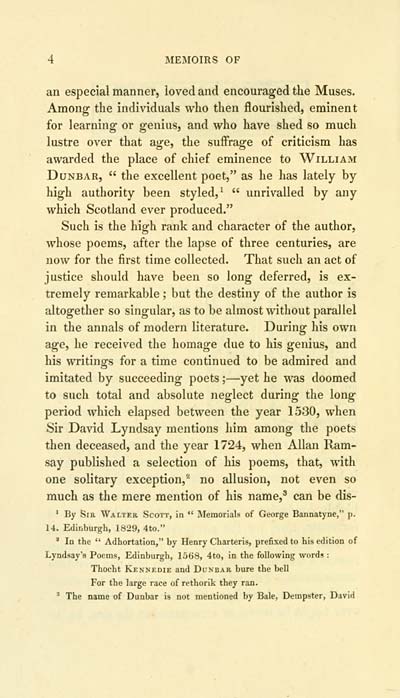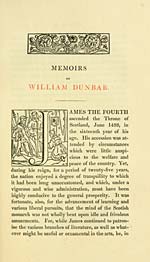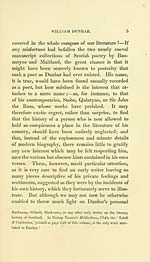Download files
Complete book:
Individual page:
Thumbnail gallery: Grid view | List view

4 MEMOIRS OF
an especial manner, loved and encouraged the Muses.
Among the individuals who then flourished, eminent
for learning or genius, and who have shed so much
lustre over that age, the suffrage of criticism has
awarded the place of chief eminence to William
Dunbar, " the excellent poet," as he has lately by-
high authority been styled,^ " unrivalled by any
which Scotland ever produced."
Such is the high rank and character of the author,
whose poems, after the lapse of three centuries, are
now for the first time collected. That such an act of
justice should have been so long deferred, is ex-
tremely remarkable ; but the destiny of the author is
altogether so singular, as to be almost without parallel
in the annals of modern literature. During his own
age, he received the homage due to his genius, and
his writings for a time continued to be admired and
imitated by succeeding poets ; — yet he was doomed
to such total and absolute neglect during the long
period which elapsed between the year 1530, when
Sir David Lyndsay mentions him among the poets
then deceased, and the year 1724, when Allan Ram-
say published a selection of his poems, that, with
one solitary exception,'^ no allusion, not even so
much as the mere mention of his name,^ can be dis-
' By Sir Walter Scott, in " Memorials of George Bannatyne," p.
14. Edinburgh, 1829, 4to."
' la the " Adhortatlon," by Henry Charteris, prefixed to his edition of
Lyndsay's Poems, Edinburgh, 1568, 4to, in the following words :
Thocht Kennedie and Dunbar bure the bell
For the large race of rethorik they ran.
' The name of Dunbar is not mentioned by Bale, Dempster, David
an especial manner, loved and encouraged the Muses.
Among the individuals who then flourished, eminent
for learning or genius, and who have shed so much
lustre over that age, the suffrage of criticism has
awarded the place of chief eminence to William
Dunbar, " the excellent poet," as he has lately by-
high authority been styled,^ " unrivalled by any
which Scotland ever produced."
Such is the high rank and character of the author,
whose poems, after the lapse of three centuries, are
now for the first time collected. That such an act of
justice should have been so long deferred, is ex-
tremely remarkable ; but the destiny of the author is
altogether so singular, as to be almost without parallel
in the annals of modern literature. During his own
age, he received the homage due to his genius, and
his writings for a time continued to be admired and
imitated by succeeding poets ; — yet he was doomed
to such total and absolute neglect during the long
period which elapsed between the year 1530, when
Sir David Lyndsay mentions him among the poets
then deceased, and the year 1724, when Allan Ram-
say published a selection of his poems, that, with
one solitary exception,'^ no allusion, not even so
much as the mere mention of his name,^ can be dis-
' By Sir Walter Scott, in " Memorials of George Bannatyne," p.
14. Edinburgh, 1829, 4to."
' la the " Adhortatlon," by Henry Charteris, prefixed to his edition of
Lyndsay's Poems, Edinburgh, 1568, 4to, in the following words :
Thocht Kennedie and Dunbar bure the bell
For the large race of rethorik they ran.
' The name of Dunbar is not mentioned by Bale, Dempster, David
Set display mode to: Large image | Transcription
Images and transcriptions on this page, including medium image downloads, may be used under the Creative Commons Attribution 4.0 International Licence unless otherwise stated. ![]()
| Early Gaelic Book Collections > J. F. Campbell Collection > Poems of William Dunbar > Volume 1 > (24) |
|---|
| Permanent URL | https://digital.nls.uk/81328703 |
|---|
| Description | Volume first. |
|---|---|
| Shelfmark | Cam.2.e.18 |
| Additional NLS resources: | |
| Attribution and copyright: |
|
| Description | Now first collected with notes, and a memoir of his life by David Laing. |
|---|---|
| Shelfmark | Cam.2.e.18-19 |
| Additional NLS resources: | |
| Description | Volumes from a collection of 610 books rich in Highland folklore, Ossianic literature and other Celtic subjects. Many of the books annotated by John Francis Campbell of Islay, who assembled the collection. |
|---|
| Description | Selected items from five 'Special and Named Printed Collections'. Includes books in Gaelic and other Celtic languages, works about the Gaels, their languages, literature, culture and history. |
|---|

